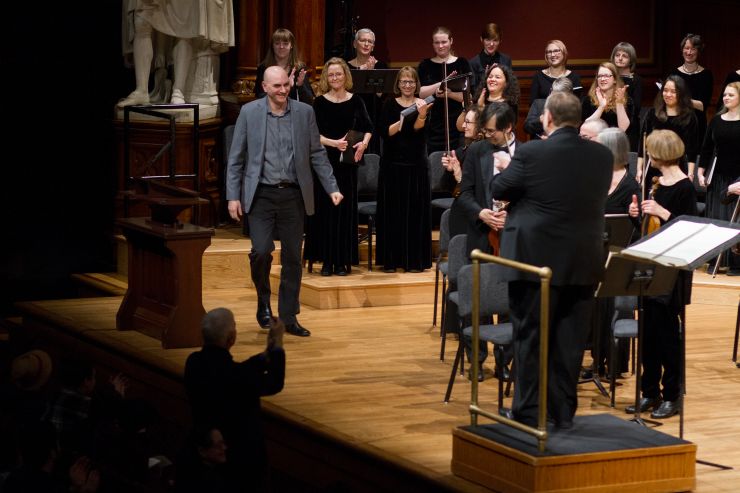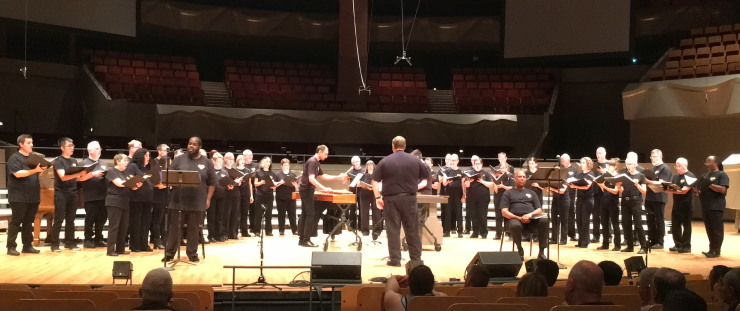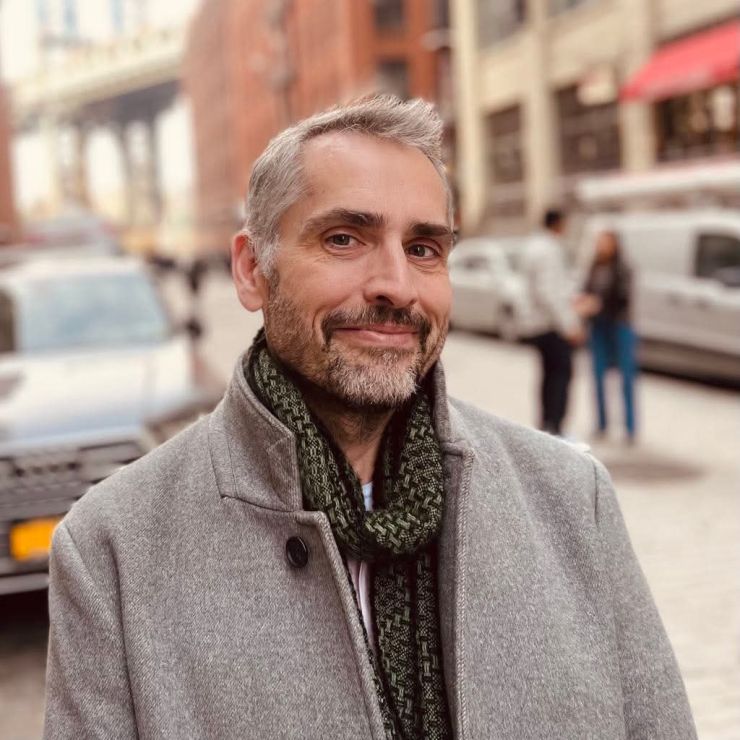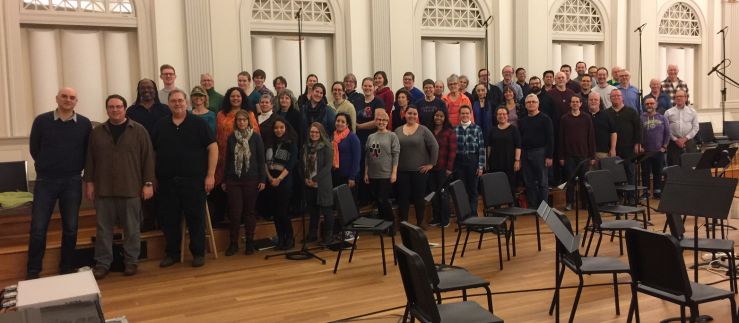Program Notes
WE ARE HERE
Rage Against the tyrant(s) by Kareem Roustom (2018)

Kareem Roustom at the premiere of Rage Against the tyrant(s), March 2018
There are two ways in which a composer comes to setting a text to music. The first is an instance when a text connects so viscerally with a composer that there is no choice but to set it. When, on the other hand, a commission is requested from a composer, for a concert with a broad theme, it is up to him or her to find the right text. This path is, by far, the more difficult of the two and such was my experience with this commission from Coro Allegro. I was very happy to be approached by David Hodgkins about writing a new work for Coro Allegro that dealt with some elements of the crisis in Syria. At first, I hesitated, because since 2011, when the uprising in Syria began, almost all of my concert music output has focused on this theme. As Syria, and specifically Aleppo, had become synonymous with cruelty and the greatest failure of our generation, I felt that I had said all I needed to say on the topic, for now, and I needed a break. But things change, not least of all the 2016 election results here in the United States. So I felt that I did need to write this work but I wanted to create a work that was both specific, Syria, and broad, tyranny. So began the work of finding the right text with the end result being the street chants, poetry, and liturgical text here.
The uprisings in the Arab world began with simple but fundamental demands, often expressed through protest chants. That people had to erupt on to the streets, and suffer for it, to demand “bread, freedom, and social justice” still brings me great sadness. The euphoria felt by the protesters in some of these countries was viciously tempered by the realities of the cruelty that their governments were prepared to mete out upon them. Iraqi-American poet and author Sinan Antoon’s When I was torn by war reflects this harsh reality to great effect with his compact but powerful poem. Even though he wrote it in 1990 and was reflecting on the situation of Iraq at that time, Antoon’s poem’s image of endless war is enduring in its relevance and emotional impact. The destruction of Aleppo, and the lament over this tragic loss, is captured in Syrian-American poet and author Mohja Kahf’s Aleppo the Necklace Broke All the Words Fell Apart. Kahf’s “list poem” is, like the city it describes, multi-layered with meaning and history; both distant past and recent. For instance, the line “blood river” alludes to the executions of 79 or so men and teenage boys in January of 2013. Their bodies were dumped in a river in Aleppo (I still remember the day I saw the photos in the news). Kahf’s poem also addresses Aleppo’s multi-cultural and multi-faith past with references to both an Armenian folk song as well as Jewish liturgical songs. GnencAbdē is a traditional Syriac — a language similar to Aramaic — prayer used during Holy Week. The text tells of Christ, on the night of his passion, washing the feet of his disciples, some of whom were about to betray him. His example of forgiveness is one of the most enduring throughout the ages, but I chose this text because I am asking “when do we forgive those who betrayed us?” The final text comes from my brother, Elias Roustom. It speaks of a glorious past, perhaps real or imagined, and the willingness of a people to strike a bargain with tyrants in order to “go along to get along.” This is what the text tells us happened in Syria but it is also a warning, for the complacent, about what could happen anywhere. — Kareem Roustom
The commissioning of Rage Against the tyrant(s) was made possible by the generous support of three co-commissioners, T. Jefferson Kline, Julie Anderson, and Tom Regan.
–––––
Aluta Continua: The passion of David Kato Kisule by Eric Banks (2016)
Recounting the last days and legacy of the Ugandan LGBTI activist David Kato Kisule (1964–2011)

Reginald Mobley in the title role with Coro Allegro at the LGBTQ+ GALA Choruses Festival 2016
I first heard about Coro Allegro several years ago, when a singer named Natalie White auditioned for my ensemble, The Esoterics. White, who had recently moved to Seattle from Boston, had sung with Coro Allegro for several years. She loved the community around Coro Allegro, and had wonderful things to say about the ensemble’s long-time director, David Hodgkins. Both Coro Allegro and The Esoterics are members of the international LGBTQ+ GALA Choruses association, but are “mixed” ensembles, in that they are comprised of members of ALL sexual orientations. Our groups are in the “minority” at the GALA Festivals (because our memberships are not fully LGBTQI). In my mind, our groups represent the future of the gay choral movement, where people sing together regardless of their sexual orientation. It was only a matter of time before I met Hodgkins; we frequented all of the same conferences, and led similar ensembles. After Natalie’s glowing recommendation, I did a little online research, and was impressed with Hodgkins’ programming and craft. When we finally met at Chorus America several years ago, we became fast friends.
For several years, Hodgkins and I spoke about working on a project together. After several conversations over several seasons, Hodgkins and I met and spoke at the ACDA convention in Salt Lake City about my writing a piece for Coro Allegro to sing at the 2016 GALA Festival in Denver. When the idea of a premiere at the GALA Festival came to the fore, I knew that I could finally write a piece that could recount David Kato’s story for an international audience.
Kato was killed on my 42nd birthday. I remember this vividly, because I am a fan of Rachel Maddow, and her coverage of Uganda’s “kill the gays” bill (the “brainchild” of the American evangelist Scott Lively) was a daily feature of her then-new show. It is hard enough to believe that people are still living in countries where homosexuality is punishable by death, but it is completely insulting to me that AMERICAN evangelists are responsible for cultivating this hatred in sub-Saharan Africa (as well as in many other places) under the guise of a religious “mission,” while the American LGBTQI community is caught up in its own (for lack of a better word) “distractions.” While I think it is good for Americans to celebrate victories on the front of human rights, I truly believe that we are not free until EVERY queer person in the world is free. If American missionaries are still sowing international hatred, it is the responsibility of American progressives to fight this hatred with understanding and attention. We need to hear stories like Kato’s. People’s lives are still very much in danger.
The story of David Kato Kisule is a tragedy. For this reason, I have chosen to let the texts of this piece speak for themselves, and to leave out nearly all of the adjectives and adverbs that composers normally put into their scores. This libretto is based on several sources — newspaper articles, blogs, the documentary films God loves Uganda and Call me Kuchu (“kuchu” is the Bantu word for “queer,” by the way), and several hours of interviews with Kato’s friend Long Jones (John Wambere), a Ugandan gay man who found asylum in the Boston area. There is a lot to cover in Kato’s story, and much of the text in this piece has to be sung and understood quickly and clearly. For this reason, I have adapted much of the texts that I gathered for this work.
“Aluta continua” is a slight misspelling of the Portuguese phrase “a luta continua” (“the struggle continues”), which was used as a rallying cry during Mozambique’s war for independence. It was coöpted by the Ugandan LGBTI community to cultivate popular support in the face of opposition (or perhaps an American religious colonial presence). The piece is composed for double chorus, but only requires antiphony in the funeral scene, where one chorus represents the “Christian” protestors and the other Kato’s friends and family. This role of Kato was created for Reginald Mobley, who was the first to suggest to me that this piece be called a “passion” — not only to describe Kato’s unflagging ardor for his cause, but to recognize that, like Christ, Kato was murdered after speaking truth to power.
Among the “borrowed” material in this piece are two hymn tunes — GREATOREX and BETHANY — otherwise known as the Gloria Patri and Nearer my God to thee, as well as By the rivers of Babylon, the 1978 song made famous by Boney M. According to Long Jones, it is common to sing this song “karaoke style” after a funeral of a beloved friend, and to substitute the name of the deceased for “Zion” in this line “...when we remembered Zion.” The double-marimba writing is meant to refer to the playing of the Ugandan akadinda (or amadinda), a pentatonic Ugandan idiophone that is performed with at least two players, who play in quick on/off-beat alternation while facing each other. To represent the tension between Uganda and the colonial West, the two marimbas always play in transpositions of the pentatonic set, while the chorus and soloists sing in Western diatonic modes. The momentary dissonances between the two pitch sets are completely intentional.
Whenever a piece like this is completed, there are so many people to thank. First and foremost, I have to thank David Hodgkins, the director of Coro Allegro, who has the courage to program a “passion” such as this for his audience in Boston, and take it to GALA, the international festival of LGBTQI choruses. I am so grateful to Tanya Cosway, who, with her husband Paul and daughter Lizzie, have been amazing hosts and support for me while I have been in residency in Cambridge. The singers of Coro Allegro have been so inspiring in their willingness to meet and embrace such challenging subject matter without hesitation. I was honored to have several hours of interviews with John Wambere (Long Jones), who experienced so many of these harrowing moments first-hand. I have quoted John several times in my libretto, and his words have indelibly shaped my own musical rendering of these events. I am so grateful to John for sharing his story. Finally, none of this would have been possible without the generosity of Tom Regan and John Brown, who immediately stepped forward to financially support this project (when it was only a concept) without hesitation. I hope that, as this work will strive to honor the life and legacy of Kato, who gave voice to the voiceless in his struggle for human rights, Aluta continua will also honor the memory of Tom’s parents.
Thank you SO VERY MUCH, David and Coro Allegro. It has been my honor to create this music for you.

— Eric Banks
Aluta continua: The passion of David Kato Kisule was commissioned in 2015 by Thomas V. Regan, Jr., and dedicated to Coro Allegro Artistic Director David Hodgkins; past, present and future members of Coro Allegro; and John Christopher Brown, in memory of Gertrude M. Regan and Thomas V. Regan, Sr.
_____
THANK YOU!

Recording session for Rage Against the tyrant(s) at Futura Productions
Coro Allegro is thrilled to be publishing this, our 3rd commercial album. Putting together a project of this magnitude involves many people of diverse talents whose commitment to Coro Allegro is unassailable. I want to give special thanks to the following people who made this album possible:
- Composers Kareem Roustom and Eric Banks, who supplied Coro with such beautifully crafted and thought-provoking material;
- All the commissioners whose selfless generosity allowed these brilliant works of art to come to fruition;
- The poets whose work inspired Rage Against the tyrant(s);
- Ugandan American LGBTQ+ activist Longjones Wambere, our partner, friend, and ally;
- Former Coro Allegro President and LGBTQ+ legal advocate Janson Wu, for connecting us to the LGBTQ+ Ugandan community;
- John Weston, our invaluable Recording Engineer;
- Darryl Hollister and Maverick, for providing critical listening, incisive feedback, and additional editing;
- The Board and Staff of Coro Allegro, past and present, whose unwavering vision supplied the needed support to bring about this amazing album;
- All the talented musicians for their hard work and dedication in making this album something to be proud of;
- And a special thank you to Yoshi Campbell and Tom Regan, who, as Project Managers, spent innumerable hours gathering and proofreading additional content to bring the project to completion.
With the utmost gratitude,
David Hodgkins, Artistic Director
